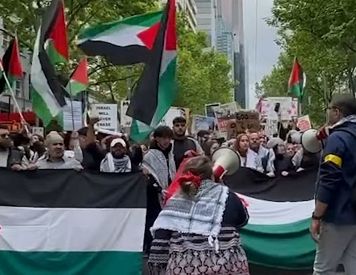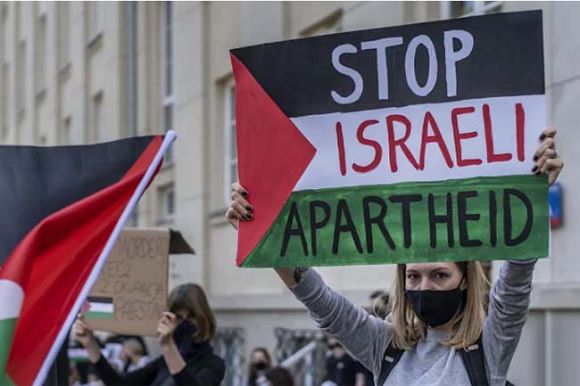A recent open letter from Hollywood creatives, condemning Jonathan Glazer's Oscar acceptance speech, only reinforces the ongoing dehumanisation of lives in Israel and Palestine, Lyn Bender writes.
TWO DECADES AGO, I stood in a grassy area next to the gallows that had ended the life of the commandant of Auschwitz concentration camp.
Rudolph Hoess had been found responsible for over a million deaths in the camp over which he had presided. Under his efficient administration, it had been upgraded from a labour to a death camp. He had lived there with his wife Hedwig and five children. In stunned incredulity, I asked myself how they could have lived adjacent to this.
I wondered whether the Jonathan Glazer movie The Zone of Interest might aid my comprehension of what seemed beyond my capacity to imagine.
How could they have lived alongside that hideous place as a family for over three years?
Unlike many Holocaust-themed movies, The Zone of Interest does not lead you through the almost clichéd spectres of frightened, herded, doomed people, selections at the railway line and gas chamber scenes.
Instead, I found myself entering the idyllic apparent ordinariness of Hoess family life. The children frolicked in well-tended gardens that are sheltered by trees from views of the wall abutting the camp.
Daily chores add to the ambience of quiet domesticity. Rudolph heads off to work in his uniform, almost like any paternalistic breadwinner.
Hedwig’s mother arrives for a visit and is shown the thriving flower and vegetable garden with its azaleas, sunflowers, rosemary, fennel and beetroot, plus “the kohlrabi that the children love”. With picnics and swims at the nearby river on sunny days. It seems so wholesome.
But there are signals of a dark undercurrent.
Glazer uses sound to imitate the industrial killing beyond the wall.
The younger son’s attic bedroom has a window that overlooks the camp from which he can see and hear some of the camp’s brutality. The soothing scene of gardeners tending the garden is disturbed by Hedwig's harsh words to these prisoner servants, "My husband could spread your ashes".
Hedwig sorts through confiscated clothes from newly arrived prisoners. She strokes the fur coat that wraps around her body and tries the lipstick she finds in the pocket. They are living on plundered goods and stolen lives.
Upon receiving an Oscar for his film, Jonathan Glazer made a speech on behalf of the Palestinians and Gaza.
Glazer denounced the hijacking of the Holocaust:
“Right now, we stand as men who refute their Jewishness and the Holocaust being hijacked by an occupation which has led to conflict for so many innocent people — whether the victims of October 7 in Israel, or the ongoing attack on Gaza, all the victims of this dehumanisation. How do we resist?”
Glazer continues to dedicate the film to a resister in the glowing night vision segment of the film. A young woman inspired by Aleksandra Bystroń-Kołodziejczyk buries food for the prisoners to find. Glazer describes her as "the girl who glowed in the dark as she did in life".
The film uses her dress and bike and has her character playing the music of prisoner Joseph Wulf — found by Aleksandra originally and played by the girl in the film.
Glazer has been denounced by several Jewish organisations, including an open letter from over 400 Jewish creatives. The letter serves to prove Glazers' point. In effect, it is their way of saying, "How dare anybody compare Gaza to the Holocaust?"
Furthermore, it seeks to refute the assertion of an "occupation", declaring that the Jews have an indigenous right to the land. It does acknowledge that every death in Gaza is tragic but that Israel does not target civilians.
As a person of Jewish heritage, I consider this a shameful denial of culpability. Starving a select population by dropping tons of bombs on a small enclave inhabited by 2 million people, with no means of escape, is another iteration of a Holocaust.
Did the movie clarify my original question concerning Rudolph Hoess and his family?
When Hoess is temporarily transferred, Hedwig – who jokingly embraces the title of "the queen of Auschwitz" – decides to stay in the place she calls paradise.
Yet, her mother leaves suddenly as she realises the proximity of the horrors after seeing the glow at night of the fires in the crematorium, even though she had praised her daughter for doing so well in life.
The film depicts her as fleeing the sights and sounds of Auschwitz, not as evidence of a moral qualm or protest. She has, after all, mused that the woman whose house she cleaned formerly was probably "in there". This was said with a casual gesture made towards the adjacent camp, sighing that in the struggle over her former employers’ possessions, she had missed out on seizing the curtains that she loved.
The Hoess family members are portrayed as "ordinary" aspirational people seeking to achieve status and prosperity. They close their windows to shut out the smell of burning flesh coming from the crematorium.
As Glazer intended, this film has remained with me. It has entered my sleep with disturbed dreams. I awoke grasping my finger in search of my mother’s ring; crying out loud that I had lost it while visiting Auschwitz. I was immensely thankful to find it was still there.
The main message from this superbly crafted film is that the horrors of the Holocaust and other atrocities are facilitated by dehumanising a group of humans to "animals", as Israeli officials have declared. In the end, it contaminates us all and produces events like 7 October and, worse still, the occupation and brutality perpetrated on the Palestinians.
We can see this genocide in action, yet our leaders remain impotent. They send the bombs while weakly decrying the carnage and urging "restraint". Trying to retrieve an image of Western humanity as it sinks into the mire of their complicity.
This film has a universal meaning.
We could all ask ourselves Glazers’ question in his speech:
"This film is not about what we did then but to ask what can we do now?"
Lyn Bender is a professional psychologist. You can follow Lyn on Twitter @Lynestel.
Related Articles
- Silence over Israeli genocide provokes social media backlash
- Israeli propaganda bordering on absurdity
- Dutton's hypocritical and shameful politicising of Palestinian visas
- Labor's decision to pull UNRWA funding is just wrong
- The dangers of Zionism behind closed doors
 This work is licensed under a Creative Commons Attribution-NonCommercial-NoDerivs 3.0 Australia License
This work is licensed under a Creative Commons Attribution-NonCommercial-NoDerivs 3.0 Australia License
Support independent journalism Subscribe to IA.















